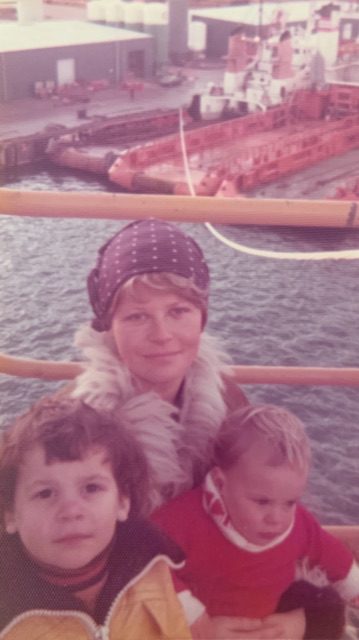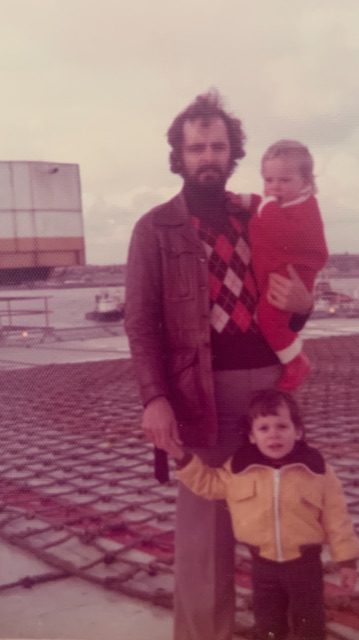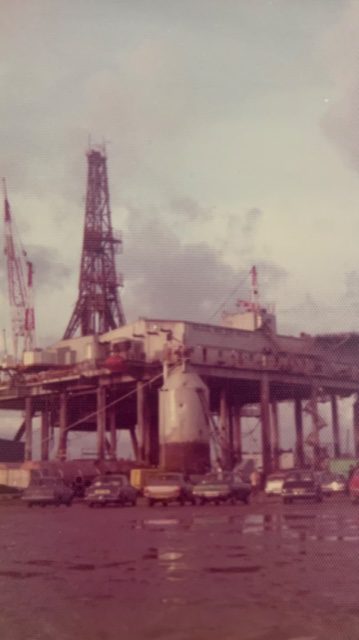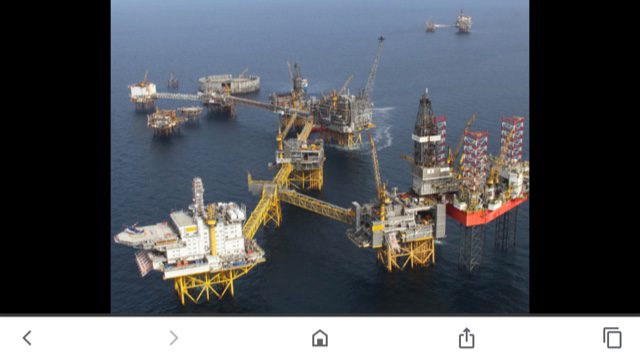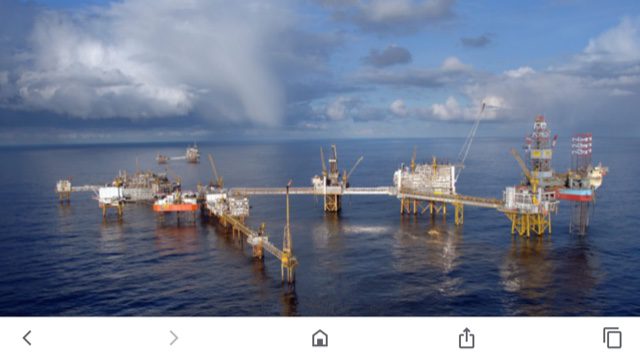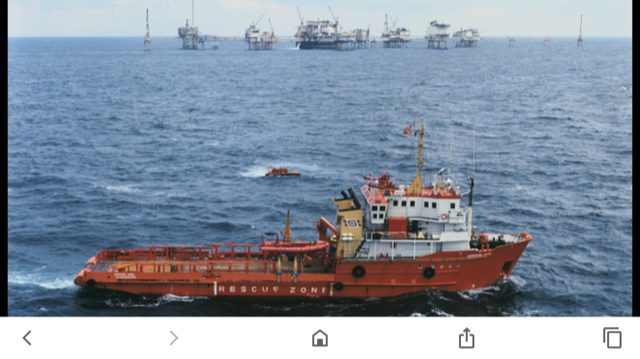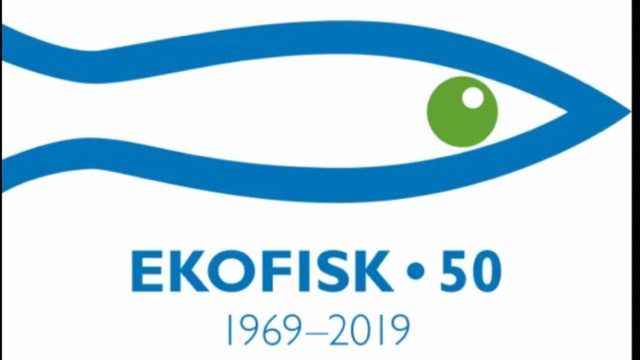Out of the Camp Ch. 15 – Ekofisk
We received a couple of calls from Tape Recorder Spares in London asking when we might be placing another order for the German antennas. After all these years, I can’t honestly remember what I told them, but they knew something was up. I don’t know to this day if they ever found out about the Seahawk, but they gave up calling after a month or two. Also, there was another call from a customer complaining about Mrs. Fleet. I asked her what the problem was, and she said that a neighbor had told her that Mrs. Fleet said that her curtains came off the ark, and that she was too cheap to buy new ones. Allegedly, the builder took them off his dead mother’s house and sold them to the customer for peanuts. When they were put up, they matched the color of the front door which was slime green (Mrs Fleet’s description) but now they were a grayish yellow color, and she was lowering the tone of the street. So, anyway, Pat started a week or so later and was much younger than Mrs. Fleet, maybe not so funny but she was a young woman, very efficient, had a great telephone manner and she could handle a word processor, which was the nearest thing we had to computers back then. I felt terrible about Mrs. Fleet because I was really fond of her and I loved how she made me laugh and she didn’t even realize she was funny. She’d give me this odd look whenever I was cracking up over some outrageous remark she’d made, and she just didn’t get it. She was the first person I ever fired.
W.D. Allen, our primary client, was keeping us busy with new installations and aerial reorientations to the new relay transmitter for customers with poor reception. Actually, it turned out that most of these jobs required new aerials because the existing ones were so old that they couldn’t be adjusted without breaking. Also, the fishing community would go to Allen’s for anything remotely electrical which provided us with additional work and sales onboard the family vessel/s. On the oil front there were additional Brown & Root supply vessels arriving and dropping anchor in the Bay, having transferred north from Great Yarmouth and this generated additional work. I even had to send Dave out in the Pilot Boat to fix a radar scanner on a dive support ship. One thing that used to really bother me was when orders for the Seahawk had been filled and we had a reasonable number of units on the shelf, Dave would sit at his bench for hours reading electronics magazines. It didn’t bother me when his colleague sat alongside him as he was only paid for work done, but I’d suggested to Dave on more than one occasion that when things were quiet, he should head down to the harbour and hang out at the market. There were always people to chat with, particularly in the mornings, and making contacts almost always would result in some service business or even equipment sales. He’d usually acknowledge this but that was as far as it went. Tommy Chalmer’s words again would come back to haunt me when he told me that my real problems would start when I started hiring people.
One quiet afternoon when Dave was out on a call and I was working in the office, Pat stuck her head round the door and said Phil from Jackson Marine was here to see me. This was unusual as normally he would just phone as he wasn’t always in town. He came in and asked if I could spare him a few minutes. My heart was hammering in my chest; I assumed there was a big problem and that we were about to take a hit. Pat offered him some tea which he accepted and then he asked me if I had heard of the Ekofisk Field. I hadn’t and so he explained that it’s a huge oil and gas project in the Norwegian sector of the Southern North Sea. The original platforms were completed in 1971 and following completion of the topsides and the pipelines, the field had recently started operating. I had no idea where he was going with this. Platforms are stationary and sit on the ocean bed so, provided they are within range of a transmitter, a conventional TV antenna would work. Of course, that no longer applies today, as satellite TV at sea is routine. Also, they normally would use a marine electronics company for offshore communications issues. Well, I needn’t have worried as it had nothing to do with any of that. He went on to explain that he had a problem and had no idea how to resolve it.
The Ekofisk Field was originally operated by Phillips Petroleum Norway, and Brown & Root was a primary contractor in the construction phase of the project. There were a number of platforms at Ekofisk Center engaged in, among other things, oil extraction, gas separation, storage, and personnel hospitality & accommodation. Two pipelines ran ashore from the field, one carrying oil to a receiving terminal at Teeside in England, and one carrying gas to Emden in Northern Germany. In addition, there were two additional platforms serving as pumping stations constructed approximately halfway along each of the two pipelines. These pumping stations were manned and required communications with both the field and the terminals in each country. Now he was getting to the point. I hope this isn’t too tedious but I have to give you some background so you can follow what’s going on…, at least I hope you can. As I mentioned earlier, Phil was communications director for the Jackson Marine fleet of supply vessels, and their parent company was Brown & Root, and it was the construction division of Brown & Root who was the contractor at Ekofisk. As they were contracted to build the two pumping stations, Phil got involved with the communications equipment installation on those platforms, and when that was completed, they were requested by Phillips to man those two stations with radio operators 24-hours a day, with 8 men on a two-week on/two-week off rotation. This meant two men on each platform working 12-hour shifts back-to-back on 14-day rotations. Got that?
Now we’re getting to his problem. The construction supervisor asked him to take care of manning the radio rooms on the platforms which he did through contacts he had with comms techs and radio operators in the industry. I suspect that what the supervisor had meant was that Phil should get his department to set it up, not round up a few radio operator pals and put them on a chopper to Ekofisk. However, he knew how it all worked, about qualifications and experience requirements, about offshore survival course training and certification, scheduling seats in advance on a crew boat or helicopter for crew changes, etc. What he hadn’t thought of and what was brought to his attention by B&R office manager, was employer and offshore liability insurances, and no one mentioned business licensing. At more than two months into the contract, he spoke to someone in the billing department to check on invoicing procedures, and when they realized what he was doing, the field superintendent was alerted and Phil received a phone call from him telling Phil in no uncertain terms that he had two choices, either quit his job and become a legitimate, licensed sub-contractor or alternatively, get rid of the problem in any way he chose but don’t disturb the existing arrangement. So basically, he was telling Phil that he couldn’t wear two hats, either you’re an employee or you’re a sub-contractor, but you couldn’t be both, certainly not simultaneously.
What Phil was proposing to me was that we take the problem off his hands and, in the process, expand our business into contract manpower. We had some time to process this and work out how we could take it over because the rotation was running smoothly, and the superintendent didn’t want that disturbed but, more importantly, wanted to avoid senior management getting wind of what was going on. What I wasn’t clear on was what our legal obligations would be to these men, and there were financial aspects that it would take time to get my head around, not forgetting employers’ and offshore liability insurances far less an employment agency license. Phil told us that he hadn’t been able to submit any invoices yet and the men needed to be paid, so that would be our first hurdle. He said that the guys out there were doing a great job and that the rig managers were happy with them, but the immediate problem was that their wives were calling and complaining that they had no money. The local lawyer we’d used for our house purchase to us not to touch it with a ten-foot pole. We didn’t like that unconsidered, knee-jerk response so we asked our Chartered Accountant (CPA in the US) what he thought. He said that provided we were convinced it would be a viable business and that we were in a position to fund the upfront costs, and were comfortable with the risk, then let’s set up a meeting with a tax inspector because that’s the other potential stumbling block. Reason being, that the operation has been trading unlicensed, illegally in a number of ways but, in particular, hasn’t been making mandatory tax and state pension deductions. He felt confident that if we approached the Inland Revenue and fessed-up, they’d likely write-off the unpaid back taxes, etc. and void any standard penalties, provided we could give an assurance that, going forward, we’d honor our statutory obligations. So, to cut another long story a bit shorter, that’s what we agree to do, and the taxman signed off on it.
We still hadn’t figured out how we were going to finance this, we were already having cash flow problems with the ships’ antennas, without warning us in advance Phil had told the men working offshore that we’d taken over the operation – which we hadn’t at this point! – and that they should call us. So, in no time at all we were receiving calls from the men offshore and their wives at home, and the men at home on their 14-day shore leave wanting to know when they were going to get paid. It just so happened that Mary and I were in the middle of selling the MacDuff house and moving to one we’d found in Peterhead and we were going to make a £3,500 profit on the deal. We could get an advance on that amount and use it to tide the families of the men over, while we formalized the arrangement with Brown & Root, set up a separate corporation and submitted invoices for the more than 2 months duration of the contract to date. Did I mention that Mary was Irish? Well, from the age of five she grew up in England and Wales so the only trace of any brogue was a mix of Welsh and Geordie, but by-heck, she had her full-on apportionment of the blarney and could talk the birds out of the trees. I assigned her the task (wishful thinking on my part!) rather, I asked her nicely, to call the men’s wives and explain that we’re still resolving the situation with Brown & Root but in the meantime, we’re sending an advance of £500 to tide them over and we’ll be able to pay them in full within the month (fingers crossed!). This was 45 years ago, remember; that was a lot of money back then. They didn’t want to jeopardize their husbands’ jobs and so went along with it, relieved that the issue was being addressed and thankful for some immediate cash.
Well, we managed to put it all together and Mary became involved in the business for the first time while I continued my main focus on the Seahawk. Just as an aside at around this time, the newly completed Aberdeen Service Company support base opened for business in Peterhead Bay and welcomed the first ever semi-submersible drilling rig to the Bay for maintenance and servicing. Not surprisingly, there was tremendous interest in the town and so an open day was arranged giving the public an opportunity to visit the rig. Almost as a portent of things to come, Mary and the boys joined me on the tour.
Images.(1) Mary and the boys on the deck of a semi-submersible rig in Peterhead Bay for maintenance, 1975. (2) Me and the boys on the helideck, same day. (3) That’s the rig! No idea which one as I was just getting into Offshore then. Unless I’m mistaken, Aberdeen Service Company arranged an ‘Open Day’ on the rig to celebrate the inauguration of the Bay as a servicing facility for deep-water rigs. That rig was the first one ever serviced in the Bay. (4) & (5) Greater Ekofisk Area Development, North Sea, Norway. (6) Fire & Rescue Tender Vessel, Ekofisk. (7) Official Ekofisk 50-Year Flag.
